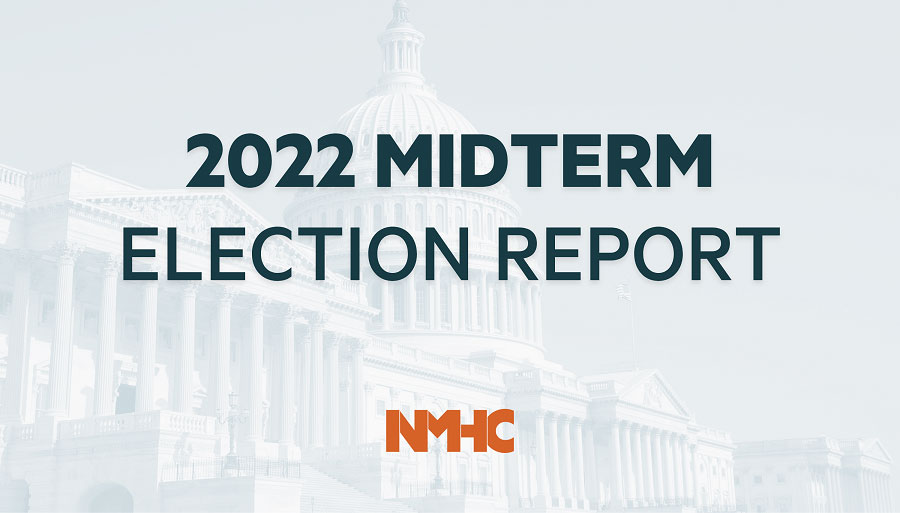2022 NMHC Midterm Election Report by NMHC
November 17, 2022

By Cindy Vosper Chetti and Jim Lapides

Cindy Vosper Chetti is Senior Vice President for Government Affairs. Reach Cindy at: cchetti@nmhc.org

Jim Lapides is Vice President of Advocacy and Strategic Communications.
Reach Jim at: jlapides@nmhc.org
Housing policy was again on the ballot in many key races with rent control cropping up across the U.S. In addition, as committee makeup in the now-divided Congress shapes up, it’s sure to have a direct impact on potential housing related legislative efforts.
Local Ballot Initiatives Translate to Rent Control Repercussions
Earlier Efforts to place rent control on the ballot failed to move forward in South Las Vegas, St. Petersburg and Tampa. However, voters in Portland, Maine, Orange County, Florida, and three municipalities in California did weigh in.
Florida
- Lastly, voters in Orange County, Florida, which encompasses the Orlando region, approved a disputed rent control measure with nearly 60 percent in favor. Like over half of the country, Florida preempts rent control at the local level. The ordinance would limit rent increases to 9.8 percent over the next year. However, a State Circuit Judge previously ordered election officials not to certify the results of the vote, declaring the ballot summary to be misleading. Following that order, the Orange County commissioners voted on November 17 to appeal the court’s decision, so the measure remains up in the air as the appeals process unfolds.
Maine
- In Portland, Maine, a “tenants’ rights” measure was approved by voters by a margin of 54 percent to 45 percent. The referendum further limits annual rent increases to 70 percent of the increase in the Consumer Price Index. It also includes a 90-day notice for any lease termination, a restriction of security deposits to amounts equal to one month’s rent and a prohibition on fees for applications, credit reports and background checks. The full text of the measure can be found here.
California
In California, voters in Pasadena, Richmond and Santa Monica considered various forms of rent control.
- In Pasadena, 52% of voters approved measure H as of the evening of November 15. The approved measure limits rent increases to 75 percent of the annual increase in the Consumer Price Index, establish a Pasadena Rental Housing Board and provide guidelines around “just cause” evictions (full text here).
- In Richmond, 56 percent of voters approved a measure further limiting rent increases to 3 percent. The full text of the measure can be found here.
- In Santa Monica, 58 percent of voters supported a measure lowering annual rent increase limits from 6 percent to 3 percent. A second measure disallows rent increases during a state of emergency declared at the federal, state or local level. The full text of these measures can be found here and here.
NMHC Has the Industry’s Back on Capitol Hill and Beyond
Whether it was a referendum or part of candidates’ platforms, housing affordability was once again on the ballot in 2022.
With new Congressional and State sessions set to kick off in the New Year, elected leaders – new and old – will soon turn their attention to lawmaking. And we’re certain numerous apartment industry priorities will face legislative action in 2023.
To help members better undesrtand the state-by-state outlook on rent control, NMHC will soon release its 2023 Rent Control Outlook memo. As we know, too many lawmakers see rent control as an easy response. Outside of costs to administer rent control, the flawed policy does not weigh heavily on a state or local budget. And while intentions may be good, we know that rent control has a perverse impact. It only serves to jeopardize the stability of our nation’s housing stock, exacerbating the housing shortages at the root of our housing affordability challenges.
The apartment industry must be prepared to aggressively fight rent control measures wherever they emerge. To that end, NMHC will once again convene its members in states where we anticipate immediate action, mobilize other allies and lead the charge against these existential threats to our industry.
In addition, as Congressional committee leadership firms up, NMHC will release supplemental resources on potential impacts related to their specific legislative agendas. NMHC will also release a new policy priorities document in early 2023 that will guide our advocacy efforts for the new Congress. Our current policy priorities document can be accessed here.
NMHC will be laser-focused on key, overarching issues such as housing affordability and regulatory reform next year. Pursuing various advocacy efforts around these issues will ensure the overall viability of the industry and our members’ ability to continue effectively operating their businesses and serving our nation’s nearly 40 million apartment residents.


